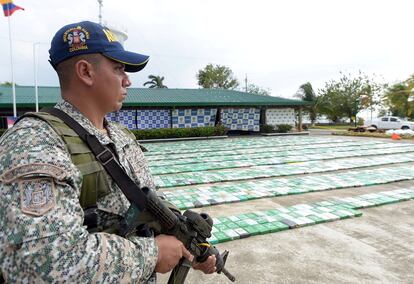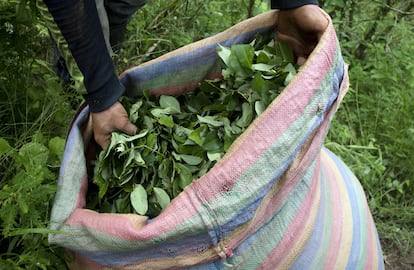Is it time to legalize cocaine in Colombia?
The losing battle against drug trafficking has opened a debate on the decriminalization of the consumption of the narcotic


In certain shops in isolated villages in the Columbian jungle, scales have replaced the more orthodox cash register. The currency here is coca paste rather than cash. Bills and coins are a rarity, something you might see on TV. Here, everything is valued in grams. How much is a beer? 1.4 grams - the equivalent of 60 cents. A pound of meat? Double that, at 2.8 grams. A cell phone? 194 grams, or $80.
The inhabitants of these remote cocaine growing areas stockpile kilos and kilos of cocaine that will later be sold to a cartel middleman, who will distribute the merchandise to nightclubs in New York, Madrid and Rome, multiplying their value by 100. The drugs are, to all intents and purposes, legal in these hidden Columbian hamlets which take several days to reach by river. Could this acceptance be extended to the rest of the country? Perhaps even to the world?
In recent weeks the debate has opened up in Colombia, the world’s main cocaine producer. “If anyone has to start this discussion, it’s Colombia - no one else is going to do it,” says Catalina Gil Pinzón, a drug policy consultant at Open Society Foundations, an organization chaired by philanthropist George Soros that champions civil society groups around the world.
The timing could be right. Colombia’s new president, Gustavo Petro, talks insistently about changing the drug-war paradigm put in place by President Richard Nixon half a century ago. The general consensus is that throwing money at chasing cartel chiefs and forcibly eradicating coca plantations has not worked. When a crop is sprayed in one area, it invariably re-emerges in another nearby. The flow of cocaine to the US reached a record high in 2021, and Colombia is producing greater quantities than ever before. Washington has squandered $10 billion in the last 20 years on failed policies.
The first to advocate for legalization are those in charge of the public coffers. The director of Colombian taxes and customs, Luis Carlos Reyes, put it bluntly: “Cocaine must be legalized and taxed.” Meanwhile, Petro recently collaborated with The Economist to produce an editorial in which US President Joe Biden is accused of being too timid regarding legalization. Biden recently pardoned 6,000 Americans convicted of possessing a small amount of marijuana; the editorial doubted he would dare to do such a thing with those sentenced for the possession of cocaine.
But Petro’s justice minister has flatly denied that the government would legalize cocaine - no administration, at least for now, wants to be seen as permissive regarding drugs - and Petro’s initial enthusiasm has not translated into any firm commitment toward legalization.
The former guerrilla fighter is first investing in an initiative to give peasants access to unused land purchased from ranchers - the first major agrarian reform implemented in Colombia - thereby creating a food industry with sufficient economic returns to compensate for any losses incurred from turning away from coca leaf cultivation. Such substitution policies have not always been successful in the past. “It’s not going to work as long as there is a large global cocaine market,” says Gil Pinzón, who considers it essential to destigmatize narcotics. “Consumption cannot be stopped, no matter what we do. Drugs do not always lead to problematic consumption, overdose or death.”
As with alcohol or tobacco, if cocaine were legal, people would have the option of consuming it or not. There are very few studies on cocaine addiction: according to Gil Pinzón, the enormous amounts of money spent on weapons to fight the cartels could be used to research the impacts of cocaine use, information campaigns and access to healthcare services.

The regulatory challenge of cocaine
The black market on which the white powder circulates has created criminal gangs capable of taking on heavily armed security forces, as has happened in Mexico and Colombia. Drug lords such as El Chapo Guzmán or Pablo Escobar are now the stuff of legend. Public officials and politicians in cocaine-producing regions are at the mercy of these shadowy figures with their parallel states. Legalization could weaken the cartels, as it would diminish their main source of revenue. “It would not put an end to them, but they would experience a shock to their finances,” says Juan Carlos Garzón, associate researcher at the US initiative Ideas for Peace. According to Garzón, the legalization of the recreational use of marijuana could serve as a guide to what might unfold should cocaine be taken down the same route. “It is not a matter of selling it in supermarkets, but of having a clear and firm regulation and generating legalized wealth,” he says.
Cocaine is arguably the most challenging of all drugs when it comes to regulation. A study by the Transform Drug Policy Foundation notes that this is partly due to the fact that there is such a wide range of coca-based products, from unprocessed leaf to cocaine in powder form to smokable crack. It also has a complex production and supply chain. Its consumption is often seen as a luxury of the wealthy, although in reality it reaches a much wider section of the population. “As it becomes cheaper and more accessible, the regulatory challenge becomes more pressing,” according to the Transform Drug Policy study. “A public health approach must focus on reducing the potential harms of its use.”
It is often said in Colombia that if the US had coca plantations, the world would be flooded with McCocaine’s. As it is, North America has a monopoly on overdoses while Latin America has a monopoly on violent deaths and the destabilization of its democracies. That is why it is a binational issue. Regulation in Colombia would not make much sense if it were not matched by the countries consuming the drug. The local market is very small and if it were legalized only in Colombia the cartels would continue to rake in the same million-dollar income as they would if they were trafficking the drug illegally. Regulation is still a long way off, but the fact that a topic that was taboo until very recently is being debated at all has perhaps opened a floodgate. One day, those small Colombian towns in the middle of nowhere might be able to say that they were the pioneers.
Tu suscripción se está usando en otro dispositivo
¿Quieres añadir otro usuario a tu suscripción?
Si continúas leyendo en este dispositivo, no se podrá leer en el otro.
FlechaTu suscripción se está usando en otro dispositivo y solo puedes acceder a EL PAÍS desde un dispositivo a la vez.
Si quieres compartir tu cuenta, cambia tu suscripción a la modalidad Premium, así podrás añadir otro usuario. Cada uno accederá con su propia cuenta de email, lo que os permitirá personalizar vuestra experiencia en EL PAÍS.
¿Tienes una suscripción de empresa? Accede aquí para contratar más cuentas.
En el caso de no saber quién está usando tu cuenta, te recomendamos cambiar tu contraseña aquí.
Si decides continuar compartiendo tu cuenta, este mensaje se mostrará en tu dispositivo y en el de la otra persona que está usando tu cuenta de forma indefinida, afectando a tu experiencia de lectura. Puedes consultar aquí los términos y condiciones de la suscripción digital.








































